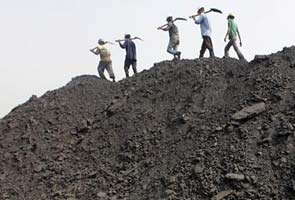
A Comptroller and Auditor General or CAG report tabled in Parliament today states that 142 coal fields were allotted to private and state-run firms without transparency and objectivity between 2005 and 2009. The BJP-led opposition says since Prime Minister Manmohan Singh held charge of the coal ministry for part of that period, he should, "introspect and resign."
Here are 10 facts on this big story:
The government's auditor estimates that the private companies allotted coal blocks had a "windfall gain" of over Rs 1.85 lakh crore because of the low prices they paid for the fields. The report says if a plan to introduce competitive bidding or auction had been implemented, the national exchequer would have got part of that money. (Read full CAG report here)
The report does not indict the Prime Minister or his office, but the opposition is targeting the Prime Minister. The BJP's Sushma Swaraj said, "Manmohan Singh is directly responsible. This time he can't blame someone else. He was the concerned minister." The BJP says this is the biggest of all scams in a UPA reign marked by scams; it also says in eight years of UPA rule, the PM held charge of the coal ministry for five and so is responsible for the alleged loss to the exchequer."The UPA II (United Progressive Alliance) is filled with incidents of corruption, each one that comes is bigger than the previous one. And this one is perhaps the biggest," Ms Swaraj said.
The government has defended the manner in which it allotted coal blocks to private firms. "There couldn't have been a more transparent means of allocation. We followed an extremely transparent method," Coal Minister Sri Prakash Jaiswal said. Coal India, he said, alone could not have met the country's demand for coal and it was necessary to bring in private players to speed industrialisation and development in the country.
The government argues that when the coal fields were allotted, existing laws did not allow for an auction. Changing policy and administrative processes would have taken several years. The delay would have hurt a surging economy and industry which needed coal. But the auditor says that competitive bidding could have been introduced in 2006. The law was finally amended in 2010.
Mr Jaiswal has rebutted the CAG report on transparency of process, saying it could not have been more transparent. There was a screening committee with representation from states and end-user ministries, he pointed out. The government says it ensured transparency by placing ads for the coal blocks that were available for allocation. Companies that responded were evaluated by the screening committee. The auditor's report states, however, that the committee has not listed how it chose companies. The CAG report states that allotments were based largely on recommendations from state governments and other ministries.
The Minister also objected to the CAG's method of calculation of loss to the exchequer. The government says the auditor has ignored crucial factors in its calculations - like the fact that the cost of extraction of coal varies from mine to mine and that underground mines yield less coal than others.
Mr Jaiswal dismissed the BJP demand for the PM's resignation as "meaningless." He pointed out that several states run by opposition parties had opposed an auction and that the BJP had agreed with the government's policy. Chhattisgarh, West Bengal and Rajasthan had felt then that an auction would increase the cost of coal and adversely impact development of industry in their areas. The BJP, however, is armed with its rejoinder on this - Arun Jaitley pointed that minerals are centrally controlled and the UPA government was not bound to pay heed to the objections that states raised.
Minutes after the report was tabled in Parliament Mr Jaiswal's colleague and Union Minister of State in the Prime Minister's Office V Narayanasamy slammed the government's auditor saying, "The Comptroller and Auditor General is exceeding its mandate" and also that the auditor did not have the last word. He said that the report will now be studied by Parliament's Public Accounts Committee or PAC, which is headed by the BJP's Murli Manhoar Joshi. "In this government, there are scams in the skies, on the ground, and underground" said Mr Joshi today, referring to the fact that another CAG report has identified financial problems with the privatisation of the Delhi international airport.
The auditor has highlighted that the initial output from mines given to private players was lower than estimated. It has also said that many firms defaulted on basic terms of their contract. For example, it says that of the 86 captive mining blocks, only 28 started production by March 31, 2011. The government will agree that it may have overestimated how quickly and efficiently the private sector could handle production, and that environmental and other clearances took longer than anticipated in many cases.
The CAG in its report tabled in Parliament today, names 25 companies including Essar Power, Hindalco, Tata Steel, Tata Power and Jindal Steel and Power (JSPL) which have got were allotted coal blocks in various states. As the report became public, the shares of some these companies saw a significant fall. On the Nifty index, JSPL was the top loser, falling 4.29 per cent. Tata Power fell 3.85 per cent, Hindalco shed 2.78 per cent, and Tata Steel closed 0.9 per cent lower.
(With inputs from agencies)

